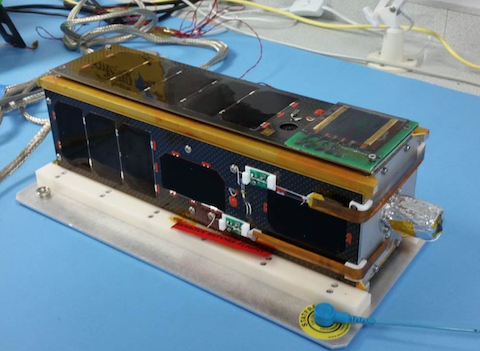 Abraham Lincoln
If given the truth, the people can be depended upon to meet any national crisis...
Abraham Lincoln
If given the truth, the people can be depended upon to meet any national crisis...
 Guildford news...
for Guildford people, brought to you by Guildford reporters - Guildford's own news service
Guildford news...
for Guildford people, brought to you by Guildford reporters - Guildford's own news service
Solar Farms in Space Are Possible According to the University of Surrey
Published on: 28 Oct, 2023
Updated on: 29 Oct, 2023
The University of Surrey, along with the University of Swansea, have announced it’s “viable to produce low-cost, lightweight solar panels that can generate energy in space”.
The universities say the first study of its kind followed a satellite over six years, observing how the panels generated power and weathered solar radiation over 30,000 orbits.

An image of a CubeSat made at the University of Surrey.
Professor Craig Underwood, Emeritus Professor of Spacecraft Engineering at the Surrey Space Centre at the University of Surrey, said: “We are very pleased that a mission designed to last one year is still working after six.
“These detailed data show the panels have resisted radiation and their thin-film structure has not deteriorated in the harsh thermal and vacuum conditions of space.
“This ultra-low mass solar cell technology could lead to large, low-cost solar power stations deployed in space, bringing clean energy back to Earth – and now we have the first evidence that the technology works reliably in orbit.”
Researchers from the University of Swansea’s Centre for Solar Energy Research developed new solar cells from cadmium telluride. The panels cover a larger area, are more lightweight, and provide far greater power than current technology – as well as being relatively cheap to manufacture.
Scientists from the University of Surrey designed instruments that measured their performance in orbit. The satellite itself was designed and built at the Surrey Space Centre in partnership with a team of trainee engineers from the Algerian Space Agency (ASAL).
Evidently, although the cells’ power output became less efficient over time, researchers say they believe their findings prove that solar power satellites work and could be commercially viable.
The study has been published in the journal Acta Astronautica.
Responses to Solar Farms in Space Are Possible According to the University of Surrey
Leave a Comment Cancel reply
Please see our comments policy. All comments are moderated and may take time to appear. Full names, or at least initial and surname, must be given.
Click on cartoon for Dragon story: Public Asked for Views on SCC’s Proposal for Reduced Speed Limits


Recent Articles
- GBC Working Hard To Mitigate Looming Weyside Urban Village Deficit
- Letter: Rapist Also Spearheaded Vicious Campaign Against the PCC
- Notice: Guildford Festival of the Arts – September 2025
- Police Investigating Wildlife Attacks At Fleet Pond Issue Three E-fits
- Wildlife Conservation Project Seeks To Protect Some of Surrey’s Rarest Habitats
- Dragon Interview: What’s Reform Guildford’s View of Local Government Reorganisation?
- ‘Astonishingly Clever’ SCC Show Garden Wins Silver for Turning Parking Spaces Green
- New Air Quality Strategy to Improve Pollution Approved by Guildford Borough Council
- Co-founder of Surrey Pride Found Guilty of Rape of 12-year-old Boy
- July By-elections To Show Relative Standings of Political Parties


Recent Comments
- Tony Harrison on Letter: A Simple Footbridge Should Have Been Affordable to Keep Towpath Over Weir Open
- David Lee on Making History As Pewley School’s Class of ’54 Hold Their Final Reunion
- David Milne on GBC Asks Residents for Views on Its Draft Building Height Guidance
- Nigel Crutchley on Drivers Caught in Yellow Box Junctions at the Dennis Roundabout Paid £81k to SCC
- George Potter on GBC Asks Residents for Views on Its Draft Building Height Guidance
- Sara Tokunaga on Letter: A Simple Footbridge Should Have Been Affordable to Keep Towpath Over Weir Open
Search in Site
Media Gallery
Dragon Interview: Local Artist Leaves Her Mark At One of England’s Most Historic Buildings
January 21, 2023 / No Comment / Read MoreDragon Interview: Lib Dem Planning Chair: ‘Current Policy Doesn’t Work for Local People’
January 19, 2023 / No Comment / Read MoreA3 Tunnel in Guildford ‘Necessary’ for New Homes, Says Guildford’s MP
January 10, 2023 / No Comment / Read More‘Madness’ for London Road Scheme to Go Ahead Against ‘Huge Opposition’, Says SCC Leader
January 6, 2023 / No Comment / Read MoreCouncillor’s Son Starts Campaign for More Consultation on North Street Plan
December 30, 2022 / No Comment / Read MoreCounty Council Climbs Down Over London Road Works – Further ‘Engagement’ Period Announced
December 14, 2022 / No Comment / Read MoreDragon Interview: GBC Reaction to the Government’s Expected Decision to Relax Housing Targets
December 7, 2022 / No Comment / Read MoreHow Can Our Town Centre Businesses Recover? Watch the Shop Front Debate
May 18, 2020 / No Comment / Read More






Roshan Bailey
October 30, 2023 at 11:13 pm
That’s good – Surrey University can drop their plans to blight the slopes of the Hogs Back then.